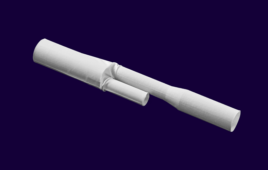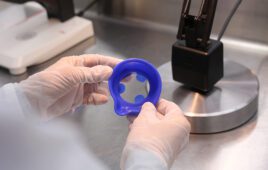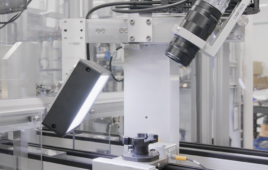
Manufacturing automation is crucial to achieving the precision, quality, and volume required in the medical device industry. Advanced robotics, AI, modular designs, and wireless technology offer the opportunity for dramatic improvements in efficiency and quality control, but leveraging these new technologies requires specific expertise. Most Medtech companies specialize in bringing life-changing products to market, not designing customized automation systems. Bringing in an automation expert, as early as possible, is a strategic way for manufacturers to reduce inefficiency, cost, and risk in future high-volume production equipment.
Engage early to reduce technical risk
Automation partners add value early in the product lifecycle in many ways. They can help answer questions such as: Should these components be ultrasonically welded, or can we join them with a UV adhesive? How would material property variations affect the forming of this component? Can we add a feature so that components can be fed from a vibrator bowl? Successful process development engineers call on automation experts for input when weighing new technologies against newly developed methods, estimating cycle time targets, and planning for different levels of automation.
Even the simplest material handling or conveying methods can have a huge impact on an automated system – affecting the cost, complexity, and throughput of the manufacturing process. An experienced automation partner captures and considers more factors that impact the scaling and commercialization of a product than most companies can achieve through internal resources alone.
Case in Point
Improving Finished-Product Quality Yield with a Customized Needle & Hypo Tube Forming Process
Wearable drug delivery devices are improving quality of life for people with diabetes, heart conditions, and autoimmune diseases. The rising prevalence of diabetes has grown the need for insulin delivery systems that simplify life for those afflicted and eliminate the need for diabetics to manage their glucose levels with tubes, injections, and multiple daily finger pricks.
Challenge
Even slight differences in the shape or angle of a needle have an impact on the depth of insertion or the rate at which a drug is released, making manufacturing precision absolutely critical. Legacy needle forming processes resulted in manufacturing failure rates as much as 40%. These poor results were due to the needle-bending machine’s inability to accommodate the small variances in tensile and yield strength found between batches of stainless steel. The bending pin had to be continuously adjusted by hand to correct the problem.
Solution
Invio custom-designed a servo-actuated process that eliminated the need for manual intervention. The now-patented system comprises a bending die, a tube gripper configured to grasp the hypodermic needle, a servo-actuated slide operatively coupled to the needle gripper, and a servo- or pneumatically-actuated bending pin. The servo-actuated slide is configured to place the needle at a predetermined bending position. The bending pin is configured to press a portion of the needle against the bending die as the bending pin rotates to form a precise bend in each needle.
Results
Implement Invio’s servo-actuated process delivered significant improvements in quality and throughput for this customer:
- 99% of finished needles meet quality standards
- Needles can be bent to any shape or size in about 9 seconds
- The servo controller is simple to adjust for linear or angled positions
To see representative solutions from Invio Automation visit Drug Delivery Device Assembly.
Benefit From a Broader Perspective
While some companies may have the internal production resources to provide this level of expertise, most don’t; or they find that an outside partner still provides additional advantage when engineering, planning, and implementing custom manufacturing automation solutions. A company like Invio, which delivers thousands of automation systems a year across multiple industries, is able to leverage knowledge gained from both similar projects and projects across different industries. This experience offers a more expansive view of systems, processes, and the most recent technologies.
Invio Automation believes that collaborating on manufacturing process development results in better definition of requirements, constraints, and the technical hurdles to overcome. When done well, this mutually beneficial relationship yields quick time to market and decreased financial and technical risk to New Product Introduction efforts and product commercialization for medical device manufacturers.
For more information, visit www.invioautomation.com or email charlie.shortridge@invioautomation.com.
Speak with an expert

Charlie Shortridge, Sales Engineering Manager
Charlie leads Invio’s Automation Solutions division. If you would like to discuss your application, he can be reached at charlie.shortridge@invioautomation.com.
5 Benefits of Process Collaboration with an Automation Partner
- Expert input for components and assembly Design for Automation
- Process scalability roadmap to efficiently implement validated processes from Pilot through commercialization
- Technology selection for feasibility and process trade-offs
- Rapid proof of process/concept capabilities to minimize technical risk
- Optimal level of automation selection for product complexity, cost, and production volume
Eric Peterson, SVP, Invio Automation
Sponsored content by Invio Automation




